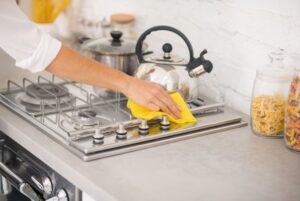How Often Should You Clean Your Kitchen Exhaust? A Complete Guide

Cleaning kitchen exhausts is vital for a safe, efficient kitchen for a home or a commercial establishment. Failure to clean your kitchen exhaust can cause grease buildup. It can reduce air quality and create fire hazards. But how often should you clean the kitchen exhaust?
This depends on the frequency of kitchen use. However, as a general rule, you should clean your kitchen exhaust twice a year. You may need to do it more frequently, if necessary, based on the situation.
In this guide, we will describe the ideal frequency for kitchen exhaust cleaning Brisbane. We will also suggest ways to ensure the safest kitchen for your home and business.
The Appropriate Kitchen Exhaust Cleaning Frequency
Both your home and commercial kitchens’ (restaurant kitchen mainly) exhaust should be cleaned regularly. Here’s the frequency of both kitchen types for your convenience.
Residential Kitchen Hood Cleaning Frequency
For homeowners, it is recommended to clean the kitchen exhaust and hood filters every 6 to 12 months.
If you cook more often, you may need to clean the filters more, like 3 to 6 months, to prevent grease buildup. If you notice that your kitchen feels hotter or if there’s a lingering greasy smell, it is time to clean your kitchen exhaust system immediately.
Commercial Kitchen Cleaning Frequency and Regulations
Commercial kitchens require frequent cleaning due to heavy use and stricter safety regulations. As per AS 1851, based on usage, kitchen exhaust systems should be inspected and cleaned every 3 to 12 months as follows.
| Cooking Hours | Inspecting and Cleaning Frequency |
| Light use- 2 to 6 hours daily | At least once in 12 months |
| Medium use- 6 to 12 hours daily | Once in 6 months |
| Heavy use- 12 to 16 hours daily | Once in 3 months |
However, in extreme conditions with thicker grease build-up, we recommend more frequent cleaning of your kitchen exhaust system, like once in 1 month.
We also recommend the frequency of cleaning based on the fuel types as follows.
| Cooking hours | Cleaning frequency for gas and electricity | Cleaning frequency for wood and coal |
| Less than 8 hours | Once in 12 months | Once in 6 months |
| 8 to 14 hours | Once in 6 months | Once in 3 months |
| More than 14 hours | Once in 2 months | Once in 1 month |
Other Factors That Influence the Cleaning Frequency
- Type of food: Greasy foods require more frequent cleaning than low-fat meals.
- Equipment used: High-grease equipment like fryers or grills demand frequent cleaning.
- Ventilation design: Efficient systems need less frequent cleaning.
- Filter type: Baffle filters need less cleaning than mesh filters.
- Visible signs of dirt: Grease buildup or poor airflow signals immediate cleaning.
- Regulations: Compliance with local fire safety laws affects cleaning schedules.
Why Is Kitchen Exhaust Cleaning Important?
Cleaning the kitchen hood, fan, and exhaust filter is vital for the following aspects.
It Ensures Grease Buildup Prevention and Fire Safety
Grease buildup is highly flammable and increases the risk of fire. Regular kitchen exhaust cleaning reduces this hazard. It ensures a safe cooking environment and Fire prevention in kitchens.
Also, you have to comply with different state laws. For example, a safe cooking environment complies with Queensland fire safety standards.
It Improves Airflow and Ventilation
Dirty exhaust systems hinder airflow. It also increases energy consumption. Exhaust fan cleaning and ventilation system maintenance ensure airflow improvement. It also promotes energy-efficient ventilation.
It Ensure Health and Safety
Regular cleaning of your kitchen exhaust ensures the removal of grease, dirt and bacteria. It ensures your health and safety. It also makes sure the building passes a health inspection.
DIY Kitchen Exhaust Cleaning Tips
Homeowners can handle basic exhaust fan cleaning and range hood filter maintenance. Here are some tips for degreasing kitchen exhaust systems:
Cleaning Range Hood Filters
- Baffle Filters: Soak in hot water with a degreaser, scrub gently, and rinse.
- Mesh Filters: Soak in warm water, dish soap, and vinegar, then scrub thoroughly.
Clean or replace filters every 3 to 6 months to improve airflow and prevent grease buildup.
Exhaust Fan Cleaning
- Turn off power, remove fan blades, and clean with soapy water and degreaser to maintain efficiency.
When to Call for Professional Cleaning for Kitchen Exhaust
DIY cleaning is useful for routine maintenance of the home kitchen. But professional cleaning services do a more thorough job. This is especially true for commercial kitchens.
Professional hood cleaning means a deep clean of the entire exhaust system. They include areas that are hard to reach, such as ducts, vents, and grease traps.
Benefits of Professional Cleaning
- Grease Trap Cleaning: Grease traps are often neglected during DIY cleaning. Professional cleaners will ensure a thorough cleaning. They ensure the prevention of blockages and bad odours.
- Improved Safety and Compliance: Experts will make your kitchen fire-safe and compliant with local laws. This reduces the risk of fires and ensures a safe cooking environment.
Final Thoughts
Clean the kitchen exhaust regularly, based on the required frequency. It’s vital for a safe, healthy, and efficient kitchen. Also, kitchens in Queensland and other states must follow local rules. This avoids fines and hazards.
Eco Cleaning Brisbane has been providing professional kitchen exhaust cleaning services in Brisbane for 20 years. You can rely on them to keep your home and commercial kitchen safe and clean. Visit them to schedule your service.
